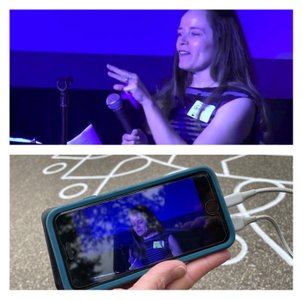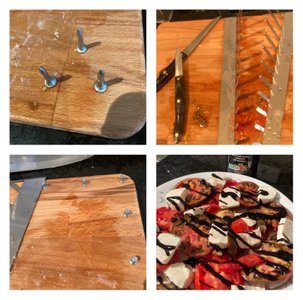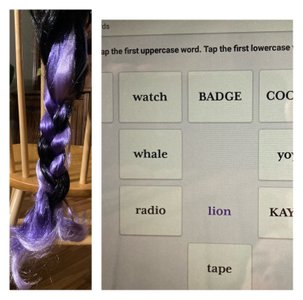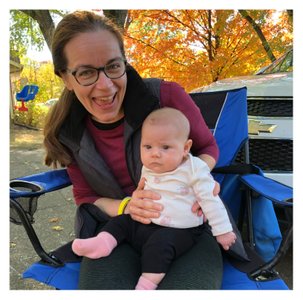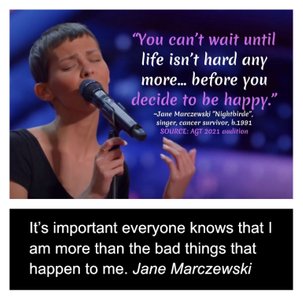Journal entry by gina andraschko —
Who Decides I Am Done With Therapy
Who decides I am done with therapy? Me? My Neurologist? OT? Speech? What are the criteria for cessation of rehab? Late April marks a culmination of demonstrated simulated practice with self-awareness and self-advocacy to ensure my therapists are making congruent decisions on behalf of me.
The question remains, “Who decides I am ready as a clearly aphasic person to navigate alone most times for most things”? My rehab team concluded I am capable and strong-willed enough to maneuver arduous interchanges “in the minute”. At the time, I was almost feeling let down from my team with feelings of uncertainty. Eventually, I acquiesced by looking at the evidence (a list my team wrote for me including the goals already met). Realization about the next steps emerged; the need to practice without a safety net to gain experiences with my speech and deficiencies was apparent. Aphasia and stroke recovery is similar to my experience learning to drive as teen; most practical experiences happened not under the watchful eye of parents. Months of training prepared me to enter the world as an aphasic person and stroke survivor.
Wait… What? Released from therapy for the summer - a young bird taking flight for the first time?… Sure, I was driving and setting my own appointments and such, but for some reason I was unnerved. Feelings about returning to work someday might be to blame. Spending the bulk of my career in nursing as a vascular access nurse, the expertise developed naturally lended itself to teaching my passion. Starting over with a new career in nursing is one thing, but starting over with a new job and place with aphasia is quite another! The precipice of diving head-first to the abyss of unknowns with barely dry wings terrified me!
Frozen Tongue Syndrome
Duress with accumulating stressors is likely to bring on “frozen tongue” phenomenon (my phrase… not medical term). Countless times after learning about aphasia and the propensity to freeze up at inopportune times, I was caught off-guard earlier this week ordering my decaf latte at Caribou. (Seriously, decaf versus caffeine… Why order coffee at all?... I digress…) Stalled to allow myself time to have my brain and my mouth align, I felt the weight of the barista upon my shoulders. Choosing to have a coffee at a coffee shop is a treat to me and I am consistent in ordering the same thing. Why now? Why that day? It's interesting what is involved with laying new nerve connections…
Sometimes with busy environments or menus, I struggle to localize my brain activity to one activity… not several. I am learning again to filter out unused stimuli to add focus to my actions. If you have kids you might resonate with my explanation. I correlate it to an overstimulating event for kids such as being at a carnival; young children are not able to hide the fact they are afflicted by the many choices presented to have fun. Kids present with almost a blank stare; often in a comparable example, a parent needs to narrow the focus on one or two options to help lessen the degree of temporary impairment to make choices themselves. Less and less, I experience the blank stare as I recover, but it's so uncomfortable now because I expect to order effortlessly. Back to the thought of working again, I anticipate more of the blank stares as I figure out actions and new experiences with a lag in my processing speed. Assimilation and adjusting to work must be onerous in light of aphasia and the lingering problems with my stroke recovery (lack of complete sensation, clumsiness on the right side, fatigue, pain, and other…).
Invisible Disability
Recently, a speech pathologist said “Aphasia is invisible”. Watching someone who has aphasia is completely boring as people-watching goes, but Aphasia paired with differences of mobility or gait are more noticeable in a waiting room or crowd. Not that I would choose to have outward signs of Aphasia, but I have a different profile of tensions or anxieties. Physically, if you are not medical in nature or trade, my post-stroke deficiencies are not apparent. Hearing me talk is another story; communication challenges are apparent immediately.
People take issue watching a language struggle, but I welcome the struggle because I need to struggle sometimes to learn… to correct myself. Now, I am more equipped with allowing myself to struggle in the moment more compared to the prior year of recovery. In my experience, I find 3 different types of observations regarding struggling with language or communication. The first is if I am struggling to find words or come up with phrases, instantly the person is coming to my rescue. This is, by far, the most common reaction - that is fueled by a helping heart. The second type of observer or reaction is not helping at all and watching the spectacle if I am stuck awkwardly floundering. This response might stem from lack of knowledge and encounters with communication difficulties. The third type involves a person who allows me to find my words slowly and helping as needed by intuition or cues I give off (signaling welcoming help). People are innately good; as I write this post, I am reminded of that fact.
Speaking with aphasia requires pre-planning as opposed to not having communication issues. As children learn to talk, it's socially acceptable to help children along normally (the parents or a teacher). It's a choice whether to humble myself for the greater good or not at a particular point in time. If I’m alone in public, I welcome the time and chance to correct myself because it's ultimately practice furthering my language rehabilitation. The subsequent times I use words similarly, I can execute the phrase or words superiorly. The invisible connection to link producing words as conversing succinctly are: finding the words relevant to the situation, positioning the throat and muscles in my face/mouth/tongue correctly, appropriate prosody (intonation, stress, tone, and rhythm) and allowing proper enunciating to avoid mumbling and ensure I'm being being heard accurately. Being content learning spoken and written English (a second time 😂) is a humongous victory with all the sequela of my stroke.
Mental and Physical Stamina
Celebration at the two-year mark after (Aug 18th) was sobering yet joyful because I realized the progress with help from my family and friends. I remember last August having a hard time as well. The stroke event brought me through uncharted territory by way of rocky waters. All my life, I struggled with little… Sure, occasional conflicts or limited hardships as a teenager and young adult happened, but I was not prepared mentally or physically to endure day-after-day gearing up to attack the days and months in succession with a positive attitude and grateful heart and give all that I have each day to my recovery after the stroke.
Be Prepared With Grace
Truth be told, I am tired… So tired…!
Before my stroke, I was more balanced in my life. Juggling being an active citizen working and life at home, I managed my interests to grow myself and appreciate family and friends while caring for myself and others. Self-sufficientness summarized me before August 2020. Feelings of worrying about the future fill my mind now along with thoughts of optimal healing. I am human after all… Make no mistake; I am not giving up on my recovery. My family and friends allow me to persevere to a point of defying odds. I still maintain hope because I am still progressing quickly - in “neuro recovery time” that is… The language acquisition is astounding. My focus is changing month to month according to my current needs or wants and abilities according to the pain or sleeping or general needs.
How much perseverance and grace with myself is prudent to recovery?... A hell of a lot!
April
- Out for the summer from rehab (4/27/22)
May
- Sow garden
- Start school for stroke students one day a week
June
- First century (100 miles) ride after stroke
July
- Started cannabis for pain and help for sleep
- Andraschko reunion
August
- 2 year mark of stroke
- Turned 46
- Demuth reunion
- 27th wedding anniversary
September
- Break the Barriers (Key note speaker at MnCan’s fundraiser event)
- Hurricane Ian (destroyed sisters house)
October
- Visit new baby
- Harvest garden
-
I spoke as the keynote speaker for MnCan’s Break the Barriers ...Nursing buddies gifted me an adaptive cutting board and tools to ...Patients and caregivers love hearing from you; add a comment to show your support.Help Gina Stay Connected to Family and Friends
A $25 donation to CaringBridge powers a site like Gina's for two weeks. Will you make a gift to help ensure that this site stays online for them and for you?
Show Your Support
See the Ways to Help page to get even more involved.


